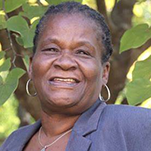 |
 |
 |
Vol.
27, No. 1
January 2024
Family Partners Impact North Carolina Child Welfare Policy and Practice
How have those with lived experience of North Carolina's child welfare system impacted policy and practice? To find out, Children's Services Practice Notes attended a meeting of the NC Child Welfare Family Advisory Council and interviewed Teka Dempson and Gina Brown, two of its members.
Family Engagement in NC
North Carolina has long believed parents and youth should be involved in the design and delivery of child and family services. Past examples of our state honoring the family voice include the implementation of the Multiple Response System (MRS), the integration of the "Engaging" practice standard into child welfare services, the development of Strong Able Youth Speaking Out (SaySo), and other community-based programming. Yet even with these successes, our state understood it needed to do more to weave the family voice throughout the entire child welfare system.

Teka Dempson
For this reason, North Carolina included the development and implementation of a family leadership model in its 2016 federal Program Improvement Plan. The goal was to create a model that integrated family voice into policy, practice, and programming. One major component of this model involved North Carolina's Division of Social Services (NC DSS), in partnership with the Center for Family and Community Engagement at NC State University, bringing family and youth perspectives to the table and establishing the NC Child Welfare Family Advisory Council (CWFAC). This state-level council gives parents and youth opportunities to be full partners in the planning, implementation, and evaluation of child welfare services. CWFAC is comprised of young adults with former experience with the child welfare system, birth parents who have received child protection services, foster parents, adoptive parents, and kinship parents.
To learn more about NC's Family Leadership Model click HERE
"North Carolina made the best investment by establishing the CWFAC. We are changing the way people perceive Family Partners," CWFAC member Teka Dempson told Practice Notes. "There has been a huge shift over the last couple of years when it comes to family engagement. This statewide council has led to the development of local family engagement committees [in Durham, Forsyth, and Richmond Counties]. These are examples of the state 'walking the walk.' I believe we are a model for other states."
CWFAC's Impacts
At least one Family Partner serves on each of North Carolina's five Design Teams (Workforce Development, Permanency, Continuous Quality Improvement, Safety, and Well-Being). Family Partners also serve on various state-level workgroups and committees such as the Prevention Planning Workgroup, Transition Age Youth Workgroup, Safe Babies Court Project State Advisory Group, Sobriety Treatment and Recovery Teams (START) Advisory Group, and more. Family Partners have also facilitated parent cafes, written articles, presented at conferences and webinars, and co-trained resource parents. Additionally, North Carolina has been one of a small number of states to include Family Partners in joint planning with the Children's Bureau.At least one Family Partner serves on each of North Carolina's five Design Teams (Workforce Development, Permanency, Continuous Quality Improvement, Safety, and Well-Being). Family Partners also serve on various state-level workgroups and committees such as the Prevention Planning Workgroup, Transition Age Youth Workgroup, Safe Babies Court Project State Advisory Group, Sobriety Treatment and Recovery Teams (START) Advisory Group, and more. Family Partners have also facilitated parent cafes, written articles, presented at conferences and webinars, and co-trained resource parents. Additionally, North Carolina has been one of a small number of states to include Family Partners in joint planning with the Children's Bureau.
Dempson and her colleague Gina Brown both appreciate the support they have received to help prepare them for those various roles. "The Division of Social Services knows they need to be clear with us about the purpose and prepare us for our role," Brown said. This includes assessing the Family Partners' readiness to participate and setting the stage by sharing who will be in the room, questions that will be posed, and helping them consider what topics may be difficult. Brown added, "State leaders have taken the time to get to know us, value our strengths, and build trust. It has become a true partnership."

Gina Brown
Through their involvement in these groups, CWFAC members have had a significant impact on our state's child welfare system. One change Dempson is particularly proud of involved changing language on forms and documentation and helping develop language for the practice standards. For example, CWFAC asked that the terms "case number ID" be changed to "family ID" and "visitation" to "family time."
Members of the CWFAC also provided feedback on North Carolina's structured decision-making tools. There is a Family Partner who co-trains resource parents in the pre-service course Trauma Informed Partnering for Safety and Permanence - Model Approach to Partnerships in Parenting (TIPS-MAPP). Additionally, Family Partner involvement within the Leadership Advisory Team resulted in specific recommendations for our state's Prevention Services Plan, including determining eligibility for Family First Prevention Services Act-funded services.
Moving Forward
"Because NC DSS provided quality training on all aspects of child welfare and topics such as strategic framing on how to share our story and find healing, those of us who have been a part of the CWFAC from the beginning can now help support and coach our newest members," Brown said. She shared that because they have been prepared for meetings and can fully contribute, their voices have been heard and valued. "We are no longer just a seat at the table. Our voice is embedded, and we are expected to be there."
At their November 2023 meeting, members of CWFAC echoed the value of the support, coaching, and technical assistance they have received. One Family Partner shared how members of the council have learned about one another's strengths and lean into one another to speak up on the topics about which they feel most passionate and with which they have lived experience. Another spoke of being empowered by council members to provide input and navigate spaces she never thought she would be in. Others shared that serving on CWFAC can feel overwhelming at times because there is so much to be done. One young adult with lived experience said too many young adults have not yet had their voices heard, and that she looks forward to a future where there is space for more of them to be involved.
For more information about the NC Child Welfare Family Advisory Council, click HERE
